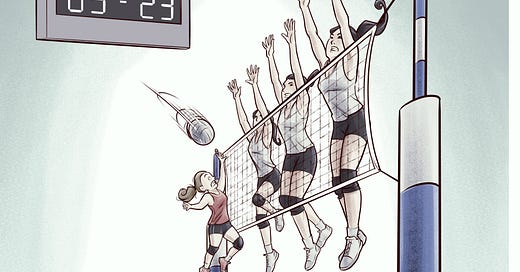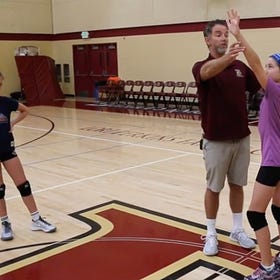Back in May, I appeared on the VolleyPod, hosted by Tod Mattox and Davis Ransom (link below). Before that, I collaborated with Tod on a Drill In Depth (link below). This month, Tod released a book and he solicited two lists from me for inclusion in the book. I’ve included the lists below. Before I get to my lists, here’s a plug for Tod’s book. (You can hear Tod talk about here.) There’s so much in this book for coaches of all ages and experiences. It’s so easy to pick it up, flip to a page and give yourself something to think about. It’s also great for picking a topic, going to that section, and seeing what insights you can gain. The book is an opportunity to get little glimpses into the hearts, minds, and souls of your favorite coaches. I highly recommend this book. You can buy it on Amazon.
As for the lists I wrote for the book…
There are two major areas of coaching that really rev my brain up, coach learning/development and performance analysis. So when Tod asked me if I wanted to contribute a list to his project, I asked if I could contribute two, one for each of those areas. It was a fun exercise to boil down my favorite ideas into bite-size chunks. I hope the lists give you ideas but also inspire you to dig deeper.
10 Favorite Lessons I've Learned from 10+ Years as an Analyst
There are lots of lessons I've learned in my time as an analyst. These are ones that have risen above simple rules of thumb or efficiency hacks. They shape how I think about and do my job.
The “best” metric is the one that helps your head coach better understand their own perspective on the game better.
There are a lot of fun and interesting metrics, but the “best” metrics are the ones that impact decision making.
“Marginal gains” are only worthwhile when you've maxed out all the big gains. Keep perspective on what happens a lot and what happens a little and scale their importance accordingly.
The game is played by 12 slot machines in shorts. Choosing a strategy is not choosing a single outcome from many outcomes, it's choosing a set of possible outcomes from many sets of outcomes.
All our metrics are proxies. It's important to be aware of what each metric does and does not describe well.
The strength of numbers is strength in numbers. It's hard to tell a complete story with a single number so use multiple metrics to tell more complete stories.
Averages disguise variability. Every action has a range of common outcomes that each occur often, not one “average” outcome that happens every time.
Standards are great for practice but the only standard in competition is your opponent.
If you want to make a story good, add stats. If you want to make a good story great, add video.
Sometimes risk is an analysis, sometimes risk is a feeling. There are moments for deliberation and moments for intuition and a big part of the job is figuring out which moment you're in.
10 Principles for Developing as a Coach
I've learned that there's so much more to getting better at my craft than just reading and going to clinics and conferences. Here are some principles of learning and development that I've taken from a variety of scholars.
The difference between learning by chance and learning on purpose is reflection. The rest of this list relies on learners reflecting on their learning.
According to Donald Schön, there are two kinds of reflection, “reflection in action” and “reflection on action”. Use both.
According to Robin Hogarth, we learn both intuitively and deliberately. Taking deliberate control of our learning environment ensures that what we learn intuitively is positive.
According to Lev Vygotsky, learning can be facilitated by “more knowledgeable others”. Make use of mentors who help you shape your learning environments.
According to Jean Lave, “We are always learning what we are already doing. That makes us apprentices to our own changing practice.”
According to Barbara Rogoff, “a person develops through participation in an activity.” Learning is not about what you read or listen to, it's about how you change what you do.
According to Parker Palmer, we teach who we are. Learn who you are and who you want to be and build your teaching on that foundation. That authenticity is more valuable than all the techniques, tactics, and drills you might learn.
According to Rob Gray, you must have a theory of learning. Whether you realize it or not, what you believe about learning affects both how you teach and how you learn.
According to both Pierre Bourdieu and Urie Bronfenbrenner, your ideas about what you can learn and do are shaped by your history and your environment, even as you shape them in return. Be aware of how you and your environment shape one another.
According to Daniel Chambliss, a sport is not one continuous hierarchical world but many different, sometimes overlapping worlds. Learn what matters and what works in your world, not “at the next level”.
My appearance on The VolleyPod:
Tod’s Drill In Depth:
Drills in Depth - 46 Challenge with Tod Mattox
I’ll be presenting at the AVCA convention this weekend and I hope you can attend both the convention as a whole and my sessions in particular. I now have two sessions! The first is called “Music and Magic: Ideas for Coaching, Planning, Managing, and Creating” and is scheduled for Saturday, 12/21 at 9:00am. The second session, scheduled for Saturday, 12/21 at 11:30am, is called “Risk _____ to Win _____: Identifying and Managing Competitive Opportunities”.





